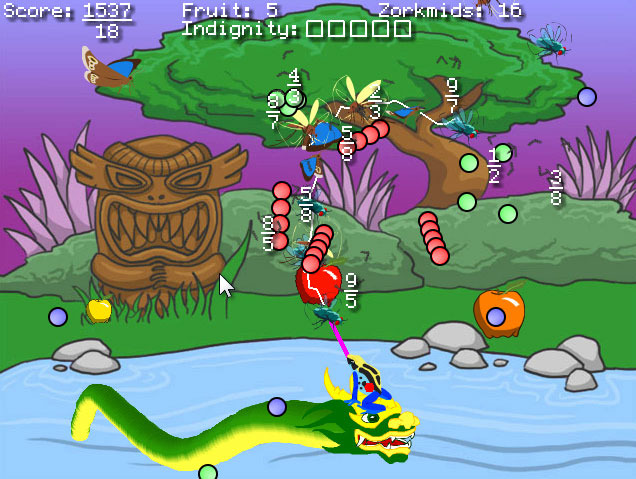The day Frog Fractions hit the Ars Technica Orbiting HQ was... not the most productive day in the site's history. Instead of focusing on writing, practically every member of the Ars editorial staff spent a few hours plumbing the depths of the odd, ostensibly educational title and discussing its abiding strangeness.
If you've played the game, you probably know what I'm talking about. If you haven't, you really should give the free online version a try before reading on, because the rest of this piece is going to necessarily ruin some of the game's magic. We'll wait...
Seriously, we're not moving on until you play the game. Give it at least 15 minutes to really grab you and show you what's going on. If you're still stuck figuring stuff out, you can peek at this walkthrough to move on, but don't do so unless you're really confused. Don't worry, this story will still be here afterwards.
You're back? Good. So unless you gave up after a few minutes, you probably understand what an unexpected surprise it was to discover such an inventive, clever, and downright odd experience hiding underneath what seems, on the surface, to be a pretty disposable Missile Command-ish Flash game. The surprising depth (literally) helped the game become a miniature viral hit upon its release, though primarily with a certain class of obsessive game fan.
"Even now I don’t have a good sense of the scale of [the game's reach]," creator Jim Crawford told Ars in an interview. "I think a disproportionate number of the people who like it were game developers. ... I definitely lucked into it in a respect. In a very real sense, Frog Fractions was luck. I was doing something I thought was cool and my friends thought was cool, and I was proud of it when I released it, but following that up is like trying to win the lottery again."
The problem with making something as genuinely surprising as Frog Fractions is that it's a hard for a developer to do it more than once. "For a long time, I thought making a follow-up to Frog Fractions was impossible because people expect this stuff from me now, so I can’t surprise people," Crawford said.
Pay me to surprise you

His solution to that dilemma is one of the strangest crowdfunded sequels we've ever seen. Frog Fractions 2 won't actually be released under that name, but it will see a hidden, stealth release as a different game from a different developer. The idea is to offer the same level of surprise that players felt when discovering the mysteries in the original Frog Fractions by hiding it in a place they'll never expect it.
"[Frog Fractions 2] will probably be called something like 'Lost Kingdom: Reckoning,' by Fork Bomb LLC or 'Turbo Finance 2015' by Vespenta Holdings," Crawford writes on the game's Kickstarter page. "Does that Russian flight sim on Desura look suspicious to you? Better play it just to make sure! Or maybe it'll be a plugin for BonziBuddy and you'll discover it when your grandpa asks you to make his e-mail go faster. Wait, are you playing Frog Fractions 2 right now?"
Crawford realizes that it's a bit odd to ask fans to support a game that, by definition, he can't tell them much of anything about beforehand. As it stands, backers won't actually get a copy of the mystery game until "the jig is up," i.e. the secret has been broken and "you start to see articles in the enthusiast press about it." Backers have already sent him guesses as to the game's true identity, with some suggesting that the Kickstarter itself (with it's strange time-travel-and-intentional-video-compression-artifact-filled video) is the actual game. Crawford denied that idea, saying the game would be an actual, executable file you'll be able to download next year.
"It's been a tricky line to walk, figuring out exactly how much to say," Crawford said. "I always knew that I wanted to say nothing, that I wanted to make it a complete surprise, and the question is how much do I say about that."
Of course, if Crawford really wanted to maintain the surprise of Frog Fractions 2, he could have skipped the Kickstarter campaign and just released the game secretly without any announcement. But it's hard to make a living releasing secret games that players have to discover the mere existence of. As it stands, when the original Frog Fractions went viral, Crawford only made back his server costs by selling the soundtrack separately. "If I didn’t need to pay rent I would be silently working on Frog Fractions 2 and not tell anybody when it was out. In part, the Kickstarter is kind of about 'How am I going to live for the next year?'”
Even though Frog Fractions wasn't a financial success, Crawford said the original game did "make me a reputation, which is how I’m able to hypothetically now make games on my own terms." That reputation is probably a large part of why Crawford has managed to raise over $33,000 of his $60,000 goal from over 1,200 backers in less than a week.
"I'm very open about how much I’m not telling you," he said of the Kickstarter effort. "This is the point of the process, I can’t tell you what I’m going to do. As a result, I’m actually a little surprised that anybody is giving me any money, because I’m basically saying I’m going to take your money and go away for a year and a half. And I’m not going to tell you when I’ve released the game, so who knows! If I were a backer I would be really concerned about that.
"I’m really trading on my reputation as someone who has delivered on something like that in the past," he continued. "A lot of people know where I live, they’ll find out if I moved and sue me or something."
Rediscovering mystery

For Crawford, both Frog Fractions and its sequel are an effort to recapture the sense of mystery and discovery that was built-in to the games of his youth in the '80s. He recalled the sense of disbelief that pervaded the schoolyard when his friends talked about Metroid's Samus Aran actually being a woman, or the fabled Minus World in Super Mario Bros.
"That one of these stories came true actually lent credence to all the other stories," Crawford said. "Because there just wasn't a lot of information about games in that era—there wasn't GameFAQs or endless previews on game sites—every game was that mysterious. Basically, at no cost to the developer, every game had this weird air of mystery to it, just by virtue of being an interactive piece of software. I think it really enhanced the experience of the player, made it much more interesting and compelling.
"I wanted to make a game that would bring back that experience to people," he said of the odd, stealthy release plan for Frog Fractions 2. "Not just, 'Oh, this game has a weird other game that is a huge part of it and an enormous secret,' but maybe that means every game I play could have that as well. Maybe if I dive underwater in Call of Duty I’ll find this huge viking castle to explore or something like that."
Some of that lack of mystery in modern games is probably just the difference between being a kid and being an adult, Crawford admitted. But part of it is what he sees as a troubling trend towards games that hold players' hands and push them towards the finish line, rather than letting them explore. He specifically cited 2011's The Legend of Zelda: Skyward Sword as frustrating for explaining every little bit of the game rather than letting players figure things out for themselves.
“People have been paying lip service for a long time to the idea that everybody should finish every game," Crawford said. "I think when you see people actually trying to implement that, you get games that are either very simple or very hand-holdy. I think the drive for that is games are so much more expensive, so you need to have the expanded audience to people who haven't played many games. You don't want, for example, only people who have played past Zelda games to play the new one. But if your way of doing that ends up turning off the people who have played the games before, that’s probably not a net win."
The original Frog Fractions is at the extreme opposite end of the spectrum from Skyward Sword, telling players next to nothing about its true nature. It wasn't always this way, though. During development, Crawford said the game had an extensive tutorial telling players "exactly how everything is working and what you needed to do." Those tutorials only got removed after a playtest session that Crawford called "one of the pivotal points in the game and I guess in my life."
"[Tester] Tim played and refused to read anything... he spent half an hour before he figured out how to dive. And I was pulling my hair out, 'Dude, you're missing all the tutorial pop ups,' but his reaction afterwards was that it was amazing. He compared discovering that he could dive underwater to discovering you could burn bushes in The Legend of Zelda, which is one of my top 10 moments in video gaming. That was the point where I realized I could do something really special."
The risk to this approach, of course, is that some people may never figure out how to dive, giving up on the game as just a silly diversion before unlocking what really makes it special. But Crawford says that's a risk you have to take.
"I think probably at least half the people who play it don't [figure it out], and I’m OK with that. If I can let half of the people have a better experience, it’s worth letting the other half of people walk away. ... I've outright told people 'If [other] people don't get it, let them walk away.' Maybe pester them to come back to it later, but don’t force them to play it for hours if they're miserable. And don’t ruin it, don't tell them how to advance, because it's so much better if you discover it on your own."
For Crawford, that potential for boundless discovery can make everything else about a game more interesting. "For me, the point is even more than the game itself is for people to wonder about it," he continued. "For people to, whenever they play a game, to wonder if there’s this huge secret underneath the pond. Beneath this curtain, is there another 90 percent of this game?
"If I wanted to be a dick about it, I could take your money and say I’ve already delivered that experience. But I don’t think that would be a very kosher way to go about things."
reader comments
29